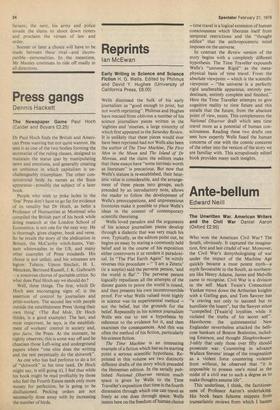Press gangs
Dennis Hackett
The Newspaper Game Paul Hoch (Calder and Boyars £2.25)
Dr Paul Hoch finds the British and American Press wanting but not quite wanton. He sees it as one of the two bodies forming the secretariat of the ruling classes, designed to maintain the status quo by manipulating news and emotions, and generally creating an ambience in which capitalism is unchallengeably triumphant. The other conspiratorial body he names as the State apparatus—possibly the subject of a later book.
People who wish to poke holes in the 'free' Press don't have to go far for evidence of its venality but Dr Hoch, as befits a Professor of Humanities at Montreal who compiled the British part of his book while doing research at the London School of Economics, is not one for the easy way. He is thorough, gives chapter, book and verse. So he retails the story of the abdication in Britain, the McCarthy witch-hunts, Vietnam whitewashes in the US, and many other examples of Press misdeeds. His choice is not unfair, and his witnesses are legion: Tolstoy, Upton Sinclair, H. L. Mencken, Bertrand Russell, J. K. Galbraith —a sonorous chorus of quotable critics. So what does Paul Hoch say we should do ?
Well, three things. The first, which Dr Hoch sees encouraging signs of, is the assertion of control by journalists and print-workers. The second lies with people outside the establishment Press 'doing their own thing'. (The Red Mole, Dr Hoch thinks, is a good example). The last, and most important, he says, is the establishment of workers' control in society and, ipso facto, the Press. At the moment, he rightly observes, this is some way off and he chastises those Left-wing and underground papers where "one elite does the writing and the rest perpetually do the shitwork".
As one who has had perforce to do a lot of "shitwork" in his time (and, Dr Hoch might say, is still going it), I feel that while his book might be read profitably by those who feel the Fourth Estate needs only more money for perfection, he is going to be disillusioned. Pecking orders are not necessarily done away with by increasing the number of birds.


































 Previous page
Previous page